UNITED NATIONS - "With 210 cases already reported this year, Pakistan is now the world’s largest remaining reservoir of polio," the United Nations Children’s Fund (UNICEF) said in a statement marking World Polio Day.
According to the agency, the annual number of polio cases has fallen from 350,000 in 1988, to 416 in 2013, and 243 so far this year – an extraordinary drop of more than 99 per cent. "All but three countries where polio was firmly entrenched – Afghanistan, Nigeria and Pakistan – have eliminated the virus within their borders. "
But UNICEF said Nigeria has had only 6 cases this year, down from 49 in 2013. "Afghanistan has reduced transmission to very low levels, with most cases linked to Pakistan," it said. "While polio remains endemic in only three countries, it continues to pose a risk to children everywhere, especially in countries which have not made routine immunisation a priority, like South Sudan, the Central African Republic and Ukraine," UNICEF said.
"Outbreaks in Syria, Iraq, Cameroon, Equatorial Guinea and Somalia can be traced to Pakistan and Nigeria."
Outlining progress of its Global Polio Eradication Initiative, UNICEF said every day a 1000 or so children are being protected from disability as part of a 26-year global effort to eradicate polio through a worldwide campaign that has immunised millions of previously-unreached children across the globe.
Some 10 million people today would ,otherwise, have been paralysed, while an additional 1.5 million lives have been saved through the routine administration of Vitamin A during polio vaccination drives, UNICEF said in the statement on Friday. The annual number of polio cases has fallen from 350,000 in 1988, to 416 in 2013, and 243 so far this year – an extraordinary drop of more than 99 per cent.
“In 1988 polio was a leading cause of childhood disability,” said UNICEF Executive Director Anthony Lake in a Press statement.
“In country after country since then, a generation of children has grown up without the spectre of polio.”
“The success of the eradication effort – reaching some of the most disadvantaged communities in some of the most dangerous circumstances – proves that it is possible to reach all children,” Lake added. “Our most ambitious and audacious goals for children can be met. And if they can be, they must be.”
Speaking to reporters at UN Headquarters, Peter Crowley, Principal Adviser, Health and Polio Team Leader, of UNICEF said, “We now have an entire generation of children that has grown up without the fear – and some cases, without even knowledge – of polio,” as a result of the 26-year long international eradication campaign.
“We are almost there,” he said, explaining that nearly all cases of polio have been wiped out, even with its recent emergence in countries such as Syria and Iraq.
While UNICEF marked the successes, it was not ignoring the remaining challenges. “Eradication is not easy; it has only been accomplished once before and that was with small pox,” explained Crowley, stressing that while the number of cases has fallen dramatically, the disease still existed.
Nevertheless, the United Nations believed that the challenges around eradicating polio are not insurmountable. To this end, he noted that is the first year the
World Day was being celebrated since the UN World Health Organisation (WHO) had declared polio free. This was a significant achievement, because just five years ago, India had been considered the “hardest place to reach people with the virus.”
He was joined by Hamid Jafari, WHO’s Director of Polio Eradication, and Jay Wenger, Director, Polio Eradication at the Bill and Melinda Gates Foundation.
UNICEF said it procures 1.7 billion doses of oral polio vaccine to reach 500 million children every year. And UNICEF’s social mobilisation work helps persuade families to accept the vaccine when it reaches them. Intensive efforts over the past decade have seen acceptance of the polio vaccine at their highest levels ever in countries where polio remains endemic.
“The world has never been closer to this once-in-a-generation opportunity of eradicating polio for good,” Lake said. “Every child deserves to live in a polio-free world.”
Tuesday, April 16, 2024
Pakistan now a polio hub, says UNICEF

Israeli Air Force finalizes preparations for possible attack on Iran
8:21 AM | April 16, 2024
Rising street crime alarms twin cities’ residents
April 16, 2024
Arrest made in deadly bus crash; owner still at large
April 16, 2024
Officials held responsible for patient’s drug denial
April 16, 2024
Police book 7 for torturing Christian family
April 16, 2024
Policing Reforms
April 15, 2024
Storm Safety
April 15, 2024
Deterrence Restored
April 15, 2024
IMF Challenges
April 14, 2024
Security Crisis
April 14, 2024
Suicide awareness
April 15, 2024
Biden’s dilemma
April 15, 2024
Over dependence on technology
April 14, 2024
Education reform call
April 14, 2024
Brain drain
April 14, 2024
ePaper - Nawaiwaqt
Advertisement
Nawaiwaqt Group | Copyright © 2024





